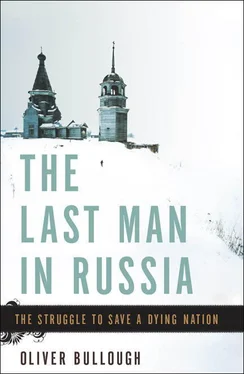The 1972 sermon is from Religion in Communist Lands , Volume 1, nos. 4–5. The other descriptions are from ‘An Eyewitness Account’ in Religion in Communist Lands , Volume 4, no. 2; and from an article by Anatoly Levitin-Krasnov found in the Memorial archives and originally published in Vestnik Russkogo Khristianskogo Dvizheniya in 1974.
The lonely struggle of Soviet Jews for emigration is described in Beckerman’s When They Come for Us We’ll Be Gone . The letter by the ‘Jewish woman’ is by L. A. Gold and is dated 5 May 1974. It comes from the Memorial archives.
CHAPTER 5: REDS ADMIT BAN OF REBEL PRIEST
The details of shops selling meat, fruit and vegetables versus shops selling alcohol come from White’s Russia Goes Dry , as do most references to alcohol statistics in this chapter. The quotes from Moskva–Petushki are taken from the English-language version published in 1998 by Faber & Faber under the title Moscow Stations .
The quotes from the sermon preached in Kabanovo are from the Vestnik Russkogo Khristianskogo Dvizheniya , no. 118 from 1976. The quotes from Father Dmitry’s confessions, here and elsewhere, are from his notebooks published as ‘Na Skreshchenii Dorog’ in the Collected Works .
Details on the number of abortions and government policy towards them come from Lutz, Scherbov and Volkov (eds.), Demographic Trends and Patterns in the Soviet Union before 1991 , from Eberstadt’s Russia’s Peacetime Demographic Crisis , from Feshbach and Friendly’s Ecocide in the USSR , and from Feshbach’s Ecological Disaster .
The Sakharov quote is from his essay ‘Progress, Coexistence and Intellectual Freedom’, which I found in Salisbury (ed.), Sakharov Speaks . The protests by Shafarevich and by Yakunin and Regelson were published in Religion in Communist Lands in 1976 and are available online at www.biblicalstudies.org.uk.
CHAPTER 6: THEY BEHAVED LIKE FREE MEN
The Father Dmitry quotes here are from his self-published newspaper V Svete Preobrazheniya . A little more on his car crash in 1975 can be found in Religion in Communist Lands , but it remains a mysterious incident.
Details on the Helsinki Accords and the formation of the Helsinki Groups are from Andrew and Mitrokhin, The Mitrokhin Archive , Beckerman’s When They Come for Us We’ll Be Gone (which is also my source for the quotes from Shcharansky), Tompson’s The Soviet Union under Brezhnev , Horvath’s The Legacy of Soviet Dissent and Lourie’s biography of Sakharov.
The Amalrik quote is from Boobbyer, Conscience, Dissent and Reform in Soviet Russia .
The text of the interview with the New York Times was published in Russkoe Vozrozhdenie , no. 2, 1978. The press-conference transcript is in Letters from Moscow: Religion and Human Rights in the USSR by Yakunin and Regelson.
Details on the abuse of psychiatry come from Fireside’s Soviet Psychopris ons, from Rothberg’s The Heirs of Stalin , from the Medvedevs’ A Question of Madness , from Alexeyeva’s Soviet Dissent , from Shimanov’s Notes from the Red House , from Nekipelov’s Institute of Fools and from Gorbanevskaya’s Selected Poems .
The story of the Soviet Union’s support of Lysenko’s quack biology can be read in Joravsky’s The Lysenko Affair and Medvedev’s The Rise and Fall of T. D. Lysenko .
CHAPTER 7: IDEOLOGICAL SABOTAGE
Andropov’s war against the dissidents is dealt with well in Andrew and Mitrokhin, The Mitrokhin Archive .
CHAPTER 8: IT’S LIKE A PLAGUE
Keith Richards’s autobiography Life is well read on the audiobook, mainly by Johnny Depp. Of many audiobooks I have listened to on long train journeys, it may be my favourite.
For Poland’s experience during and after the Soviet invasion, I relied on Kochanski’s The Eagle Unbowed and on Applebaum’s Iron Curtain . Mochulsky’s Gulag Boss is not entirely reliable, since it was written much later as a justification of his own role in the camps, but is the best we have.
CHAPTER 9: THE UNWORTHY PRIEST
Details on the Podrabineks’ trials can be found in the Chronicle of Current Events , and other reactions to Father Dmitry’s recantation of his views can be seen in Google’s news archive. I have not been able to find a video recording of Father Dmitry’s television appearance, so I have relied on contemporary observers’ descriptions of his appearance.
CHAPTER 10: THE KGB DID THEIR BUSINESS
The quotes from Father Dmitry are from his Podarok ot Boga , ‘Vernost v Malom’ and V Svete Preobrazheniya .
The quote accusing the KGB of killing the ‘spiritual father’ is from the Chronicle of Current Events . Father Dmitry wrote about Divnich in Nash Sovremennik .
CHAPTER 11: I LOOK AT THE FUTURE WITH PESSIMISM
The Gorbachev anti-alcohol campaign is described in White’s Russia Goes Dry , and its spectacular demographic effects are dealt with at length by Eberstadt in Russia’s Peacetime Demographic Crisis . The corrupt privatization deals and crooked 1996 presidential elections are well described in Freeland’s Sale of the Century and Hoffman’s The Oligarchs .
The three Russian sociologists are Ioffe, Nefedova and Zaslavsky, and their book describing degradation in the countryside is The End of Peasantry? The Disintegration of Rural Russia .
CHAPTER 12: THEY DON’T CARE ANY MORE
Details of Ogorodnikov’s torments in the 1980s can be found in his A Desperate Cry . That covers more ground than my account of his life, which more or less ends in the mid-1970s. The life story of Alexander Men is described in Roberts and Shukman (eds.), Christianity for the Twentieth Century . He was a fascinating and humane man, who deserves to be better known. The details of KGB infiltration of the Orthodox Church are from Andrew and Mitrokhin’s The Mitrokhin Archive , and from Ellis’s The Russian Orthodox Church: Triumphalism and Defensiveness .
CHAPTER 13: MAKING A NEW GENERATION
Some of the finest writing on the winter protests in Moscow was by Julia Ioffe in the New Yorker . The British journalist mentioned in the account of the Pussy Riot trial is Tom Parfitt, whose coverage of the winter of protests for the Daily Telegraph was also superb. Other journalists whose work I appreciated include Miriam Elder of the Guardian and Shaun Walker of the Independent .
‘Krasivo Sleva’ is found on the Markscheider Kunst album of the same name. I would recommend St Petersburg ska as something purely joyful to anyone who needs cheering up.
Thanks to Helen Conford at Penguin for editing sensitively but forcefully. Thanks also to Lara Heimert, my editor at Basic, for her faith in me, and to my agent Karolina Sutton at Curtis Brown.
This book has involved a lot of time sitting in libraries and travelling in Russia, and I am very grateful to the Society of Authors’ Authors Foundation for giving me the John Heygate award, which helped pay for me to do both.
I have shamelessly trespassed on people everywhere I have gone. I have been bought drinks, given food, told stories and driven to places I could not otherwise have reached. Through this, I have come to a far greater understanding of Russian culture than I previously possessed, and for that understanding and that hospitality I am profoundly grateful.
Читать дальше












